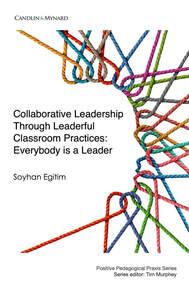Collaborative Leadership Through Leaderful Classroom Practices: Everybody is a Leader
Soyhan Egitim [ Kindle | Print | ePub | Scribd | Apple ] [Perlego] [Proquest]
(Positive Pedagogical Praxis Series)

Revisiting our leadership identity each time before we walk into a classroom can give us an opportunity to re-examine what leadership tenets we demonstrate in the classroom and to what extent our leadership practices foster or limit our students’ growth. This book attempts to shed light on the impact of language teachers’ leadership identity on their pedagogical and class management choices. It proposes a new pedagogical framework, Leaderful Classroom Practices which emerge through social, relational, and dynamic interactions between the teacher and students. Establishing an open, democratic, and participatory learning environment for all learners is a major leadership responsibility of teachers, and this book intends to demonstrate how to accomplish this mission both in theory and practice.
Excerpt from the author's preface (slightly modified): "One of the objectives of this book is to question whether my perceptions concerning language education align with the notion of providing students with open, democratic, and participatory educational environments. Furthermore, the book also intends to delve deeper into the pedagogical implications of leadership based on power and authority in the language classroom. Leadership is no longer about information sharing and decision-making. It is about listening intently and being open to learning from others, even when those others are meant to be your students. Given that language learning is a collaborative endeavor, where two or more people need to interact with one another so that some learning can happen, everyone needs to become an initiator. This notion aligns with the leadership identity I present in this book. Collaborative leadership is based on the premise of sharing leadership with others. It is fostered through the humanistic values of liberty, equity, and justice. Promoting these values to establish an open, democratic, and participatory learning environment for all learners is a major leadership responsibility of teachers. This book demonstrates how to accomplish that mission both in theory and practice."
Excerpt from the author's preface (slightly modified): "One of the objectives of this book is to question whether my perceptions concerning language education align with the notion of providing students with open, democratic, and participatory educational environments. Furthermore, the book also intends to delve deeper into the pedagogical implications of leadership based on power and authority in the language classroom. Leadership is no longer about information sharing and decision-making. It is about listening intently and being open to learning from others, even when those others are meant to be your students. Given that language learning is a collaborative endeavor, where two or more people need to interact with one another so that some learning can happen, everyone needs to become an initiator. This notion aligns with the leadership identity I present in this book. Collaborative leadership is based on the premise of sharing leadership with others. It is fostered through the humanistic values of liberty, equity, and justice. Promoting these values to establish an open, democratic, and participatory learning environment for all learners is a major leadership responsibility of teachers. This book demonstrates how to accomplish that mission both in theory and practice."
ContentsPreliminaries
References |
ReviewsThe theoretical framework of collaborative leadership, with applications as leaderful classroom practices is a first of its kind in pedagogy, and is worth exploring in various contexts. The book balances theory and practice, offering valuable insights and actionable suggestions. As an educator who has read and implemented some of the book's ideas, I highly recommend this book to anyone interested in transforming their classroom into a collaborative learning hub.
Kushal Kireeti, Dokkyo University, Japan Reviewed in Innovation in Language Learning and Teaching https://doi.org/10.1080/17501229.2024.2366256 In this book, Soyhan Egitim has established himself as a trailblazer in classroom pedagogy bringing leaderful practices directly into the classroom. In doing so, he has become a one of the first to equate the hierarchical manager-subordinate relationship in the organization to the teacher-student relationship in the classroom. So, as we begin to deconstruct individual leadership as a sole authority in managerial relations, so too must we begin to deconstruct the role of teacher as supreme authority of the learning experience. Knowledge need not be necessarily passed down from those who know to those who don’t; knowledge can too be created as we interact with one another in our respective environments.
I would also point out that Dr. Egitim has not made it easy on himself by choosing to introduce leaderful classroom practices in language instruction, a domain classically directed by the teacher in charge. Yet, through a range of in-person and online novel, interactive, and intercultural activities, he demonstrates that it is not only possible but highly effective in learning terms to bring democratic values to the classroom based on the core frame of leadership as a concurrent, collective, collaborative, and compassionate endeavor. Professor Joseph A. Raelin Donald Gordon Visiting Professor of Leadership, University of Capetown Asa S. Knowles Chair Emeritus of Practice-Oriented Education, Northeastern University Although the focus of this book is on the classroom, I read it from my personal experience of corporate training in multi-national organizations and found much to learn. By definition, global teams are made up of people from different backgrounds/geographies who need to value each individual’s perspective to reach their business goal. Top-down, authoritarian leadership extinguishes the very diversity that makes a global team successful. Research has shown that intercultural teams are more effective when they are collaborative. It was very helpful to read the real-life examples from the author’s own experience and research as well as the practical strategies to apply collaborative leadership, strategies that are easily transferable to the corporate world.
Diane Sasaki Executive Coach (Leadership Development and Diversity Training) President of SIETAR Japan This invaluable reflection on teacher identity provides both theoretical frameworks and pedagogical strategies that will help educators move beyond traditional notions of the teacher as authority figure, and develop more collaborative, learner-centered pedagogy.
Joseph Shaules Director: Japan Intercultural Institute |
About the author

Soyhan Egitim, EdD, has lived and worked in multi-cultural societies including Turkey, where he is originally from, Canada, and Japan. Since 2006, he has worked as an English language teacher in a range of educational settings in the Greater Tokyo Area. Upon completing his MA in TESOL at the University of Chichester in 2011, he pursued an academic career in Japan. In 2020, he was awarded a Doctorate in Education from Northeastern University in Boston, where he concentrated on collaborative leadership in the Japanese higher education contexts. Currently, he serves as an assistant professor at Toyo University where he teaches English and intercultural communication courses. As a multilingual expert in intercultural communication, language education, and inclusive leadership practices, Dr. Soyhan Egitim has strived to promote open, participatory, and equitable language education through academic lectures, publications, presentations, and training workshops. His publication, “Collaborative leadership in English language classrooms: Engaging learners in leaderful classroom practices” (Egitim, 2021), laid the foundation for the main ideas discussed in this book.
Publication details
Publication date: March, 2022
Print book: 83 pages, $19.99. ISBN: 9798423833473 [available from Amazon stores]
Kindle book: $9.99 [purchase from Amazon kindle stores]
Ebook: $9.99. ISBN: 9781005383138 [access Smashwords | Scribd | Apple ibooks]
DOI: https://doi.org/10.47908/22
Series: Positive Pedagogical Praxis edited by Tim Murphey
Print book: 83 pages, $19.99. ISBN: 9798423833473 [available from Amazon stores]
Kindle book: $9.99 [purchase from Amazon kindle stores]
Ebook: $9.99. ISBN: 9781005383138 [access Smashwords | Scribd | Apple ibooks]
DOI: https://doi.org/10.47908/22
Series: Positive Pedagogical Praxis edited by Tim Murphey
